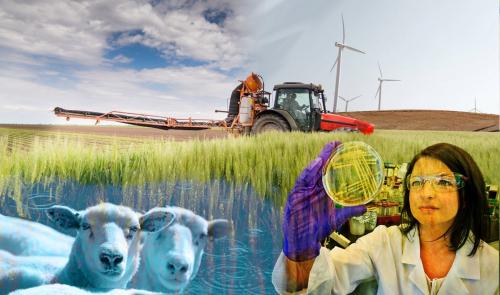The CoEs, funded by the Scottish Government, work directly at the interface between policy and research, providing responsive outputs and outcomes in areas of high policy importance: climate change, animal disease outbreaks, plant health, water and knowledge exchange and impact. The Centres draw upon the wide range of up-to-date research expertise within the Scottish Environment, Food and Agriculture Research Institutes (SEFARI), universities, colleges, government agencies and research organisations across Scotland.
These five Scottish Centres of Expertise are part of the wider Strategic Research Portfolio (SRP) for environment, land, agriculture, food, rural communities and economy. The SRP involves researchers from the mid to long term focused Strategic Research Programme (SRP), Innovation Partnerships and Underpinning Capacity funding of national resources and capabilities, all funded by the Rural & Environmental Science and Analytical Services (RESAS) of the Scottish Government.
Each bespoke CoE delivers evidence with impact and have their own style, leadership & governance. Details on each Centre can be found at the individual Centre web sites - SEFARI Gateway (Gateway); the Plant Health Centre (PHC); the Centre of Expertise for Waters (CREW); the Centre of Expertise on Animal Disease Outbreaks (EPIC); and Scotland’s Centre of Expertise connecting Climate Change Research and Policy (CXC). Although you can also read more about the work they carry out in a leaflet we recently produced.
I also had the opportunity to develop a video, as part of a collective project funded through SEFARI Gateway’s Responsive Opportunity scheme, which was filmed and produced by Circa Media. We interviewed staff across the Centres about the work they are carrying out and how they are delivering action to address the climate crisis.
In addition, at COP26 I was fortunate to chair a panel debate on the 9th November 2021, at the University of Glasgow, with representatives from each of the Centres, and RESAS, discussing some examples of the actions the Centres are taking in responding to the climate crisis. The debate, along with two other sessions on the crucial importance of achieving effective science-policy interaction and partnerships, and on how expertise in two Centres offers complementary insight into the threats from and control of insect vector-borne diseases, are discussed in detail in our next blog.
From the video, booklet and debate you will learn about examples of rapid response to COVID-19 across several of the Centres. More information can be found in the next blog, but examples include:
- Dynamic Coasts and the flooding recovery work carried out by CREW, which is helping to address the consequences of climate change and helping communities to cope from the impact of flooding.
- Secondments of Fellows from CXC into Scottish Government have provided important research connections and support over time, e.g., on energy and flooding.
- Work from EPIC directed at reducing the negative impact and wastage of animal diseases, and on understanding the risks posed by certain animal diseases under changed climatic conditions.
- PHC showcases examples of where they are strengthening resilience and emergency response plans and have contributed to improved plant disease surveillance and detection.
- Gateway highlights examples from their fellowships scheme that show delivery to policy agendas such as Just transition and to a new understanding of genetic biodiversity in response to the nature crisis.
- From RESAS we hear how advice is provided through them to support Scottish Ministers and Cabinet Secretaries for emergency response, legislation, policy development and delivery, while analyses are provided for the Directorate for Environment and Forestry and the Directorate for Agriculture and the Rural Economy.
No matter what need arises across Scotland’s natural and managed environment, whether it is the recent COVID-19 pandemic, the nature/biodiversity crisis, new pest and disease incursions or climate crisis, by having well-established and well-rehearsed platforms in the Centres of Expertise, combined with their extensive knowledge networks to help respond to these global issues, vital responses to climate, environment, land and community challenges are being addressed across Scotland and providing a capability to help meet challenges we may face in the future.
Lorna Dawson, SEFARI Advisor and Gateway Sector Lead for Environment.
